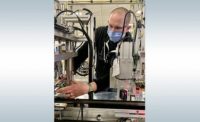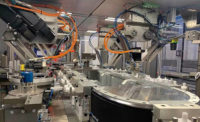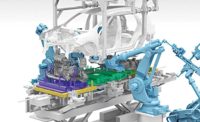1. Mikron, Festo Collaborate on Mask-Making Machine
Face masks are in short supply, but a new “factory in a box” designed by systems integrator Mikron could solve the problem.
Capable of producing 50 to 100 masks per minute, the system fits in a 20-foot shipping container that can be located anywhere, like a hospital or school. An integrated air-conditioning system with air purifying filters makes production possible even in places with high risk of contamination. With enough raw materials, the system can operate autonomously for more than two hours.
With support from automation component supplier Festo, Mikron developed the system in just six weeks. Electric and pneumatic components from Festo ensure reliable unwinding, clamping, shaping and folding of the nonwoven fabric. An ultrasonic system seals the edges.
2. Automated Line Assembles Medical Device
Steven Douglas Corp., a systems integrator in Newbury, OH, has built an automated line to assemble an adhesive-backed medical device.
Pressure-sensitive adhesive is provided on a reel. Pins accurately position the adhesive during assembly, and a vision system checks for defects.
Plastic parts are fed by two vibratory bowls. A pick-and-place unit picks up eight parts at once, transfers them across a corona treatment (to improve adhesion), and presses them onto the tape. After a vision system inspects the assemblies, the tape is cut into sheets of eight parts.
A SCARA robot packs the assemblies into boxes. The system produces six parts per second or one box every 5 seconds.
3. Welder Assembles Sensors for Medical Device
A medical device manufacturer is using a servo-driven ultrasonic welder from Dukane to assemble tiny pH sensors.
The sensor consists of a polycarbonate housing and cap that are welded together to create a hermetic seal. The company had been using a pneumatic ultrasonic welder to assemble the sensor, but the scrap rate averaged 50 percent.
Dukane recommended a 40-kilohertz iQ ultrasonic welder with Melt-Match. The servo-driven device gives engineers precise control over speed, force and distance. It collapses the assembly only when it detects that the plastic has melted. With the iQ, scrap has been eliminated.
4. Cobots Boost Output of Dental Equipment
Nichrominox has been making dental equipment in Lyon, France, for 80 years. Needing to improve productivity, the company deployed four cobots from Universal Robots on three lines.
Two cobots feed parts to presses for punching and bending operations. Another cobot tends a CNC machining center. On the third line, an operator and a cobot work side by side, assembling parts without the need for safety guarding.
5. 844.8 Billion
Global sales of disposable medical devices could top $844.8 billion in 2027, according to Grandview Research. The market is expected to grow at a compound annual rate of 16.7 percent from 2020 to 2027.







